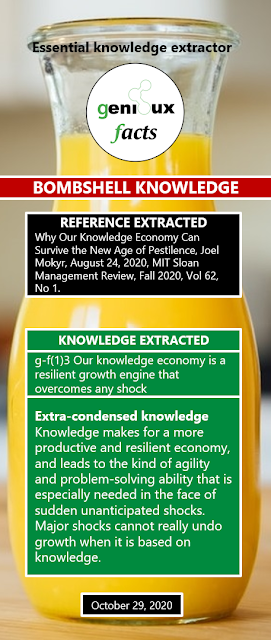Extra-condensed knowledge
Condensed knowledge
- The 20th century has shown a resilience that has no equal in history.
- Major shocks cannot really undo growth when it is based on knowledge.
- Knowledge, once acquired, cannot easily be reversed. In theory, of course, knowledge can be lost when everyone who possesses it dies and there are no stored-up copies in books or models. This can happen, and it has in fact occurred in history.
- In the past, shocks to the Smithian system that made markets work could lead to devastating and permanent damage to economic performance and living standards. The best-known case was the decline of the Roman Empire.
- What modern economic growth has achieved, based on more productive technology and the science that underlies it, is a level of prosperity that is much more resilient.
- Despite the best efforts of homicidal dictators and foolish generals, most human-made catastrophes have, on the whole, not materially slowed the rate of economic growth in the past century.
- The example that drives this home is the astonishing recovery of Germany after 1945.
- The Germans who managed the comeback called it the “economic miracle,” but in retrospect, it was not a miracle at all — just an affirmation that their prosperity rested on a solid base of knowledge.
- The pandemic is a classic unanticipated supply shock. But it will not be the next Black Death or Irish Potato Famine. In a modern economy, the advanced nations are much more resilient than ever before, even if the sharp temporary fall in output and employment seem frightening.
- Knowledge not only makes for a more productive and resilient economy but can also lead to the kind of agility and problem-solving ability that is especially needed in the face of sudden unanticipated shocks.
- Leaders of our business and technology community would be wise to keep sight of the flexibility and adaptability of our economy.
Category 1: A new, better world for everyone
[genioux fact extracted from MIT SMR]


